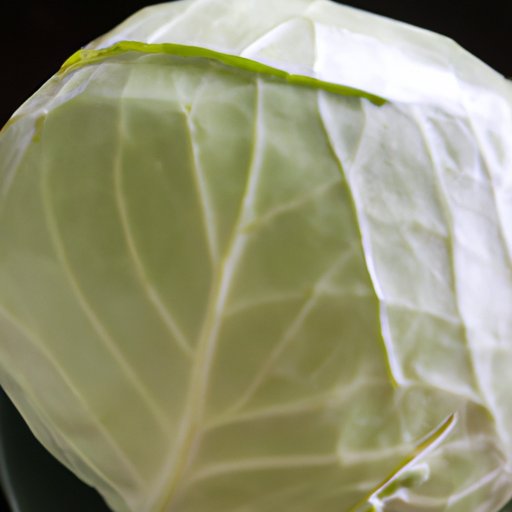
Introduction
If you have ever wondered whether it is safe to eat raw cabbage, you are not alone. Raw cabbage is a popular ingredient in salads and slaws, but some people may be hesitant to eat it raw due to concerns about digestive issues or potential foodborne illness. In this article, we will explore the benefits and drawbacks of eating raw cabbage, as well as tips for preparing and storing it safely.
The Benefits of Eating Raw Cabbage
Raw cabbage is a nutritional powerhouse, packed with fiber, vitamin C, vitamin K, and other important vitamins and minerals. These nutrients offer a range of health benefits, including supporting digestion, reducing inflammation, and boosting immunity.
In particular, the high fiber content of raw cabbage can help regulate bowel movements and promote feelings of fullness, which can aid in weight management. Meanwhile, the vitamin C in raw cabbage acts as an antioxidant, protecting the body from harmful free radicals and contributing to healthy skin, hair, and nails.
If you are looking for ways to incorporate raw cabbage into your diet, consider adding it to salads, sandwiches, or wraps. You can also use it as a low-carb alternative to traditional taco shells or sandwich bread.
The Drawbacks of Eating Raw Cabbage
While raw cabbage offers many health benefits, there are also some potential drawbacks to consider. For example, some people may experience digestive issues such as gas and bloating after eating raw cabbage. This is due to the high fiber content in cabbage, which can be difficult for some individuals to digest.
Additionally, raw cabbage contains compounds such as sulfur and goitrogens that can be problematic for some people. Sulfur, for example, can cause an unpleasant odor in certain individuals, while goitrogens may interfere with thyroid function in some people.
If you are concerned about these drawbacks, there are ways to minimize them. Cooking or fermenting cabbage can make it easier to digest, while avoiding it altogether may be necessary for some individuals.
How to Safely Prepare and Store Raw Cabbage
To ensure that raw cabbage is safe to eat, it is important to wash and chop it properly before consuming. Rinse the cabbage thoroughly under running water, removing any dirt or debris. Then, slice or shred the cabbage as desired.
When storing raw cabbage, it is important to keep it refrigerated to prevent spoilage. Wrap the cabbage tightly in plastic wrap or store it in an airtight container, and be sure to use it within a few days. If you have more cabbage than you can use, consider freezing it for later use.
Finally, it is important to be aware of the risk of foodborne illness when eating raw cabbage. To minimize this risk, be sure to purchase cabbage that is fresh and free from any signs of spoilage. If you are unsure about the safety of your cabbage, consider cooking it before eating.
Conclusion
In conclusion, raw cabbage can be a nutritious and delicious addition to your diet, provided that it is prepared and stored safely. While there are some potential drawbacks to eating raw cabbage, such as digestive issues and the presence of certain compounds, these can be minimized with proper preparation and cooking. If you are looking for ways to incorporate raw cabbage into your diet, experiment with different recipes and cooking methods to find what works best for you.




